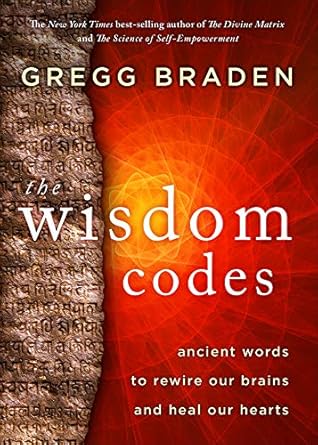More on this book
Community
Kindle Notes & Highlights
by
Gregg Braden
Read between
May 31 - June 7, 2020
Is it possible that by choosing specific words to address the challenges in our lives, we could rewire our brains to discover new ways of solving our problems?
In the recent book Words Can Change Your Brain, physician Andrew Newberg, M.D., and co-author Mark Waldman echo Whorf’s ideas and tell us precisely what the word-brain connection means. They describe this relationship clearly, stating: “A single word has the power to influence the expression of genes that regulate physical and emotional stress.”
Words can light fires in the minds of men. Words can wring tears from the hardest hearts.
“Ask without hidden motive and be surrounded by your answer. Be enveloped by what you desire so that your joy may be full.” Here we see that it’s the words that ignite the emotion that empowers our prayers as the cascade of events that follow.
The controversy about its origins stems from the fact that the Lord’s Prayer is not recorded in what’s considered to be one of the most reliable records of historic events that occurred in Jesus’s day: the book of Mark. The question is why it would be noted in the books of Matthew and Luke, yet would be curiously absent in Mark?
A declaration statement. A function statement. A completion (or resolution) statement.
The first phrase of the code is the declaration statement. These words set the stage and declare to the universe what is about to occur. They are followed by the function statements that describe what the prayer is meant to accomplish (several things). These in turn are followed by the completion statement that ends the prayer.
We all experience fear. It’s one of six emotions that scientists recognize as universal in all human populations. (The others are sadness, happiness, anger, surprise, and disgust.) In addition to being one of our
The soul cannot fail along its transition.
It’s in our willingness to accept our loss that we heal.
The only way to heal from loss is to feel what the absence of something or someone we love means in our lives. There’s a direct relationship between the emotional trauma of grief and the degree that we allow ourselves to feel our loss.
we must choose to look beyond the hurt, suffering, and pain that we’re presented with in the moment and recognize the beauty that already exists in all things.
forgiveness isn’t for the person that you are forgiving. It’s for you. Forgiveness is an act of love that you perform for yourself.
Each time we trust enough to love or nurture someone else and that trust is violated, it’s like the handle of the vessel that has broken, allowing the meal of our love to be emptied. We lose a little of ourselves to the experience. Our reluctance to open again to such vulnerability is the way we often learn to survive our deepest hurts and greatest betrayals. It’s our mechanism of protection. And each time we reduce our willingness to love by shutting off the access to our truest nature of compassion and nurturing, we are like the meal that is slowly leaving the jar that the woman is carrying.
“When you make the two one, you will become the sons of man, and when you say, ‘Mountain, move away,’ it will move away.” In other words, it’s when we transcend our self-judgment polarities of right and wrong, good and bad, and success and failure that we reclaim the lost parts of ourselves, including our capacity to love (in other words, the meal in our jar) before it slips away from us.
What do I see in this person that I have lost in myself, given away, or had taken by those who have power over me?
We sometimes create diversions that distract us from making important decisions and taking timely and meaningful action in life. By procrastinating when it comes to making our decisions, we sometimes create conditions that are worse that the initial situation we are avoiding. The consequence of delaying a difficult decision is that we give ourselves fewer options to choose among.


